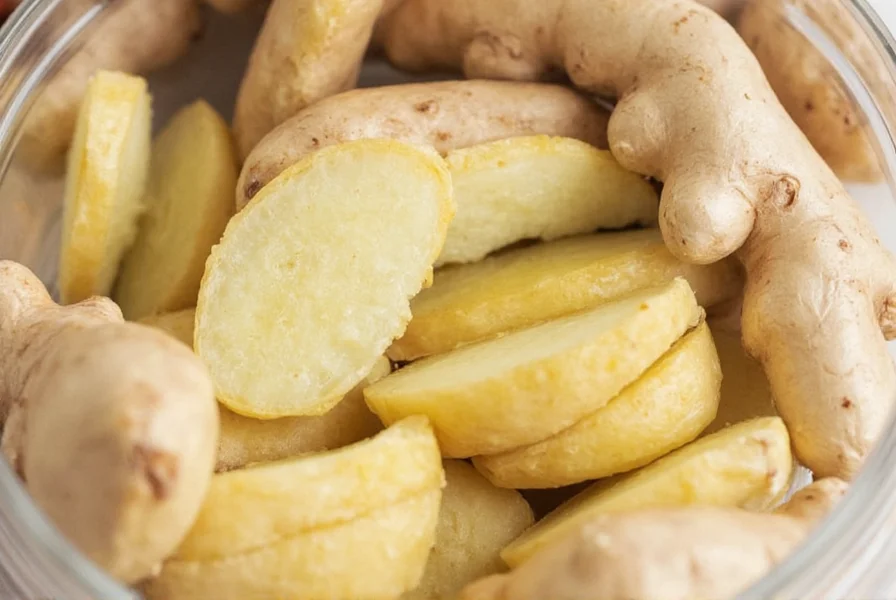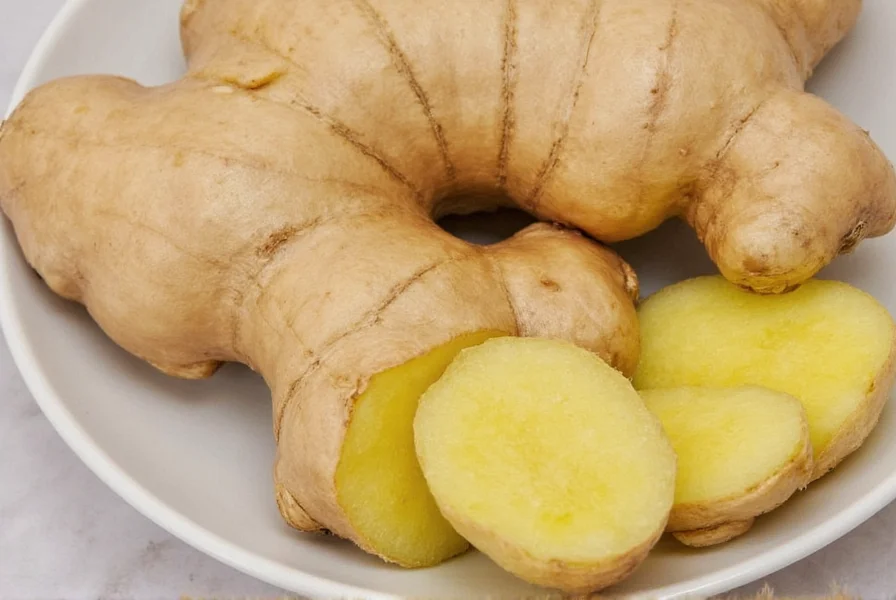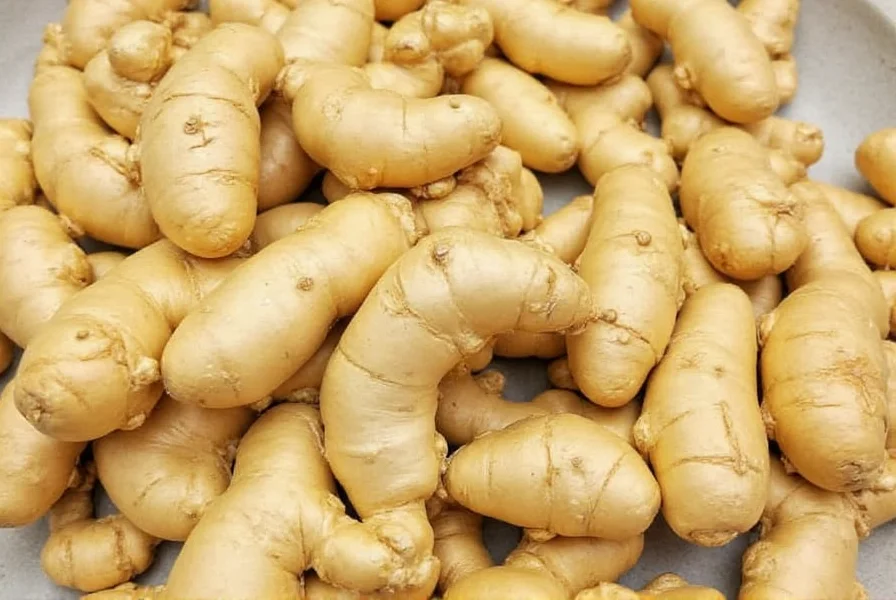Properly stored fresh ginger typically lasts 2-3 weeks in the refrigerator. When wrapped tightly in paper towels and placed in an airtight container in the crisper drawer, ginger maintains optimal freshness and flavor for up to 21 days.
Understanding how long ginger lasts in the fridge is essential for home cooks and meal preppers who want to minimize food waste while maintaining the quality of this versatile root. Whether you've bought a large quantity on sale or received a generous gift from a gardener, proper storage knowledge ensures you can enjoy ginger's distinctive flavor and health benefits for weeks.
Factors Affecting Ginger's Refrigerator Shelf Life
The actual duration ginger remains fresh in your refrigerator depends on several key factors. The initial freshness when purchased plays a significant role—firm, plump roots with smooth skin will naturally last longer than those already showing signs of aging. Your refrigerator's temperature consistency matters too; maintaining a steady 34-40°F (1-4°C) creates optimal preservation conditions.
Storage method represents the most controllable factor in extending ginger's shelf life. Simply tossing ginger into the produce drawer without protection leads to premature drying and spoilage. The moisture balance is critical—too much humidity encourages mold growth, while too little causes shriveling.
Optimal Refrigeration Storage Techniques
For maximum freshness retention, follow these evidence-based storage methods:
- Preparation: Gently wipe ginger clean with a dry cloth (avoid washing, which introduces excess moisture)
- Moisture Control: Wrap in paper towels to absorb excess moisture while maintaining necessary humidity
- Containment: Place wrapped ginger in an airtight container or resealable plastic bag with a small opening for air exchange
- Placement: Store in the crisper drawer, which maintains higher humidity levels than other refrigerator sections
- Monitoring: Check weekly for any signs of spoilage and replace paper towels if damp
| Storage Method | Expected Shelf Life | Quality Preservation |
|---|---|---|
| Refrigerator (properly wrapped) | 2-3 weeks | Excellent flavor and texture retention |
| Refrigerator (unwrapped) | 7-10 days | Rapid moisture loss, texture degradation |
| Room temperature | 1 week | Quick drying, flavor diminishes |
| Freezer (peeled, sliced) | 6 months | Suitable for cooking, texture changes |
Recognizing Spoiled Ginger: Visual and Tactile Indicators
Knowing how to identify spoiled ginger prevents food waste while ensuring safety. Fresh ginger should feel firm and heavy for its size with smooth, taut skin. As it begins to deteriorate, watch for these warning signs:
- Texture changes: Soft spots, mushiness, or excessive wrinkling indicate moisture loss and spoilage
- Color alterations: Grayish discoloration beneath the skin or dark spots signal internal decay
- Mold presence: Any visible fuzzy growth (white, green, or black) means immediate discard
- Odor changes: Sour or musty smells instead of the characteristic spicy, citrusy aroma
- Slime formation: A slippery film on the surface indicates bacterial growth
When in doubt about ginger's freshness, perform the fingernail test: press gently with your nail. Fresh ginger resists indentation, while spoiled ginger yields easily and may leak fluid.
Advanced Storage Techniques for Extended Freshness
For those seeking to maximize ginger's refrigerator longevity beyond the standard 3-week window, consider these professional techniques:
Vacuum sealing removes oxygen that accelerates spoilage. When combined with refrigeration, this method can extend freshness to 4 weeks. Simply clean and dry ginger thoroughly, then seal in vacuum bags with minimal air.
Ginger in vodka preserves both flavor and medicinal properties for up to 6 months. Peel and slice ginger, submerge in vodka in a glass jar, and refrigerate. The alcohol prevents bacterial growth while extracting beneficial compounds.
Partial freezing works well for frequent users. Freeze only the portion you won't use within three weeks, keeping the main root refrigerated. This prevents repeated temperature changes that degrade quality.
Comparing Storage Methods: Refrigeration vs. Alternatives
While refrigeration offers the best balance of convenience and freshness for most households, understanding alternative storage methods helps you make informed decisions based on your usage patterns.
Room temperature storage works for immediate use (within 5-7 days) but causes faster moisture loss. The warm, dry environment of most kitchens accelerates the drying process, making ginger shrivel and lose potency more quickly than in refrigerated conditions.
Freezing provides the longest storage duration (up to 6 months) but alters texture, making frozen ginger unsuitable for raw applications like garnishes or sushi. However, for cooking purposes where texture matters less, frozen ginger works perfectly well and retains most flavor compounds.
For gardeners with abundant harvests, preserving ginger in syrup creates both extended shelf life (6+ months refrigerated) and a versatile ingredient for beverages and desserts. Simmer peeled ginger in equal parts water and sugar for 20 minutes, then store in sterilized jars.

Practical Tips for Ginger Preservation Success
Implement these evidence-based strategies to maximize your ginger's refrigerator lifespan:
- Store ginger unpeeled until ready to use, as the skin provides natural protection against moisture loss
- Keep whole roots intact rather than pre-cutting, which exposes more surface area to air
- Place a piece of paper towel in the storage container and replace it when damp to maintain optimal moisture balance
- Store away from ethylene-producing fruits like apples and bananas that accelerate ripening and spoilage
- For cut ginger, apply a thin layer of lemon juice to exposed surfaces before wrapping to slow oxidation
When you need only a small amount, grate or slice what you require and immediately rewrap the remainder with fresh paper towel. This minimizes repeated exposure to refrigerator air that dries out the root.

Using Slightly Aged Ginger Effectively
Ginger that's past its prime but not yet spoiled still has culinary value. As ginger ages in the refrigerator, its flavor profile changes—becoming more concentrated and slightly less pungent. This matured ginger works exceptionally well in:
- Long-simmered dishes like curries and stews where flavor infusion matters more than texture
- Teas and infusions where the softened fibers release flavor more readily
- Blended applications like smoothies and sauces where texture isn't noticeable
- Vinegars and oils where the ginger flavor permeates the liquid medium
Understanding how long ginger lasts in the refrigerator empowers you to reduce food waste while maintaining quality in your culinary creations. By implementing these storage techniques, you'll ensure this valuable ingredient remains fresh and flavorful for all your cooking needs.
Frequently Asked Questions
Can you freeze ginger to extend its shelf life beyond refrigeration?
Yes, freezing ginger significantly extends its shelf life to 6 months or more. Peel and slice ginger into 1-inch pieces, place in an airtight container or freezer bag, and freeze. Frozen ginger can be grated directly into dishes without thawing, making it convenient for cooking. While the texture changes, the flavor remains well-preserved for culinary use.
Does peeled ginger last as long in the refrigerator as unpeeled ginger?
No, peeled ginger has a significantly shorter refrigerator lifespan—typically only 1-2 weeks compared to 2-3 weeks for unpeeled ginger. The protective skin acts as a natural barrier against moisture loss and microbial growth. If you must peel ginger in advance, store it submerged in sherry or vodka in an airtight container to extend freshness up to 3 weeks.
What's the best way to store cut ginger in the refrigerator?
For cut ginger, immediately wrap the exposed surfaces with a damp paper towel, then place in an airtight container. Alternatively, submerge the cut pieces in dry sherry or vodka in a sealed container. This method creates a protective barrier against air exposure and can extend freshness to 2-3 weeks. Always use clean utensils when handling stored ginger to prevent cross-contamination.
Can you still use ginger that has sprouted in the refrigerator?
Yes, sprouted ginger remains safe to eat, though the sprouting process draws moisture and nutrients from the root, potentially affecting flavor and texture. Simply cut away the sprouted section and any surrounding area that appears dry or discolored. The remaining firm portion can still be used in cooking, though it may have slightly less intense flavor than fresh ginger.
How can you tell if refrigerated ginger is still good to use?
Fresh refrigerated ginger should feel firm and heavy for its size with smooth, taut skin. Press gently with your fingernail—it should resist indentation. The characteristic spicy, citrusy aroma should be evident when scratched. Avoid ginger with soft spots, excessive wrinkling, grayish discoloration beneath the skin, mold growth, or sour/musty odors, as these indicate spoilage.











 浙公网安备
33010002000092号
浙公网安备
33010002000092号 浙B2-20120091-4
浙B2-20120091-4